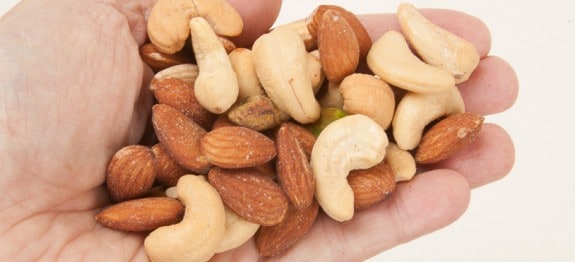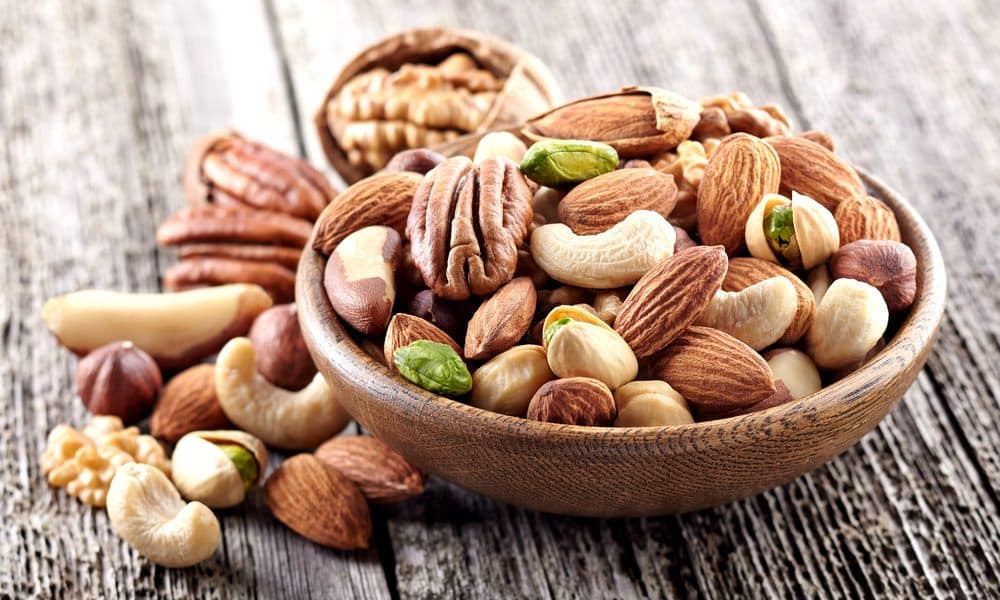What are nuts?
A nut is a plain dry fruit with one or two seeds in which the wall of the ovary becomes very hard at maturity and where the seed remains attached or fused to the ovary wall. Examples include almonds, walnuts, pecans, cashew nuts, brazil nuts, chestnuts, pine nuts, hazelnuts, macadamia nuts and pistachio nuts.
The word “nut” applies to many seeds that are not botanically true nuts. These may include cape seed, chia, caraway, flaxseed, passionfruit, linseed, poppy seed, sesame seed, pepita or pumpkin seed and sunflower seed.
Although peanuts are technically a legume, the nutritional structure of peanuts is similar to that of tree nuts, and research shows the health benefits of peanuts.
What nutrients do nuts provide?
Nuts provide a range of nutrients similar to other plant foods, including large amounts of healthy monounsaturated and polyunsaturated fats (49-74% total fat) and moderate quantities of protein (9-20%) except chestnuts which have low fat.
Nuts are a good source of dietary fiber as well and provide a wide range of necessary nutrients, including B vitamins (including folate), vitamin E, minerals like zinc, calcium, potassium, magnesium and iron, antioxidant minerals (manganese, selenium and copper), as well as other phytochemicals like antioxidant compounds (flavonoids and resveratrol) and plant sterols.
Nuts are also included in the same food group as fish, meat, eggs, poultry and legumes because of their protein content. A daily 30g serving is suggested, but an extra 10g of nuts per day can be used instead of other healthy fatty foods.
Each variety of nuts contains its own distinct nutrient combinations and is normally rich in nutrients like:
- Almonds: protein, calcium and vitamin E
- Cashew nuts: non-haem iron and low rating of GI
- Brazil nut: fiber and selenium: only two brazilian nuts per day provides 100% RDI for selenium in an adult
- Chestnuts: low GI, fiber and vitamin C (although a lot of vitamin C is lost in cooking)
- Macadamias: highest in monounsaturated fats, thiamine and manganese
- Hazelnuts: fiber, folate, potassium, vitamin E
- Pecans: fibers and antioxidants
- Pistachios: potassium, proteins, plant sterols and antioxidant resveratrol
- Pine nuts: vitamin E and the arginine amino acid
- Walnuts: alpha-linoleic acid: omega-3 plant and antioxidants
Nuts are innately low in sodium, contain potassium and most comprise some carbohydrate in the form of natural sugars. Chestnuts are distinct, where they are high in low-glycemic carbohydrates and low in fat that make them more like a kernel than a tree nut.
Do raw and roasted nuts have different nutritional value?
There are few differences in the nutrient content of raw and roasted nuts. Nuts can be oil or toasted, but the nuts are so dense that they can not absorb much oil (about 2-5% of the cooking oil).
Roasting reduces the water content of nuts by concentrating the nutrients, however also reduces the concentration of several B vitamins because they are not stable to heat.
Although it is feasible to buy unsalted, dry roasted nuts. Many varieties of nuts roasted with oil are salted and therefore have a higher sodium content than raw nuts. If you like the taste of toasted nuts, but you want to lessen your salt intake, choose unsalted toasted nuts and ditch salted ones only for special occasions.
Roasting does release the flavors of the nuts that make them taste … much more nuttier.
Are nuts healthy for your heart?

Studies recommend that eating about 30g of nuts a day can decrease the risk of developing heart disease by 30 to 50% and lessen the risk of death from heart disease by 20%.
This is based on the high proportion of healthy mono- and polyunsaturated fats in nuts and the low proportion of saturated fats and the outcomes of the studies comparing rates of heart disease in people who eat nuts rather than with those who do not.
It appears that a number of heart-healthy nutrients in nuts work together to attain this protective cardiac effect.
These comprise:
- Monounsaturated and polyunsaturated fats that promote health that assist in regulating blood cholesterol
fibers and plant sterols that help decrease cholesterol re-absorption in the gut - Arginine (an amino acid that converts to nitric oxide in the body) that helps to maintain blood vessels flexible, decreasing the risk of atherosclerosis which is the hardening of the arteries
- Antioxidant vitamins and minerals, e.g. vitamin E, copper, selenium, manganese and zinc and other antioxidant compounds like flavonoids and resveratrol that lessen inflammation and oxidation
- Normally low sodium levels and high levels of potassium that help maintain healthy blood pressure.
- Consuming an average 67g of nuts a day can also assist in improving your cholesterol.
Do nuts have an effect on the risk of developing type 2 diabetes?
Nuts can also help in preventing the development of type 2 diabetes, although further research is needed.
A large study discovered that women who ate about 30g of nuts a day on five or more of the week had about 30% less risk of developing type 2 diabetes than those who had little or no nuts. This effect has been attributed at least a part to the high levels of mono- and polyunsaturated fats obtained in nuts, which (in addition to their positive effects on blood cholesterol) is believed to increase insulin sensitivity. According to a meta-analysis, it reduced the risk of 13% type 2 diabetes by eating four 30g servings of nuts every week.
Nuts could benefit people with type 2 diabetes because they help decrease the overall glycemic index of the diet. When added to carbohydrate-rich foods, nuts slow the movement of food through the intestine and decrease blood sugar levels after the meal and the phytochemicals found in nut skins can slow down the digestion of carbohydrates.
Nuts can also help decrease the risk of developing Metabolic Syndrome – a group of metabolic measures that, if left untreated, can result into type 2 diabetes, heart disease and high blood pressure.
Should I eat nuts if I don’t want to gain weight?
A little handful of nuts (30-50g) per day is not linked with weight gain and may also assist in decreasing the risk of obesity. Healthy fats in nuts can make you feel fuller, which helps restraint your appetite.
And as fat is trapped in the fibrous structure of the nut, it moves through the body instead of being digested.
Nuts can be part of a healthy diet to retain or even lose weight, provided your total kilojoule intake does not grow. Eat a handful of nuts in replacement of less healthy foods like muffins, crisps, biscuits, cakes, chocolate and so on.
Is it possible to eat nuts on a Mediterranean diet?

Including a handful of nuts (30g) each day in a Mediterranean diet or the use of extra virgin olive oil has more health benefits than reducing fat diet. A study revealed the following:
- Reduction of cardiovascular events (like stroke, myocardial infarction, and death from cardiovascular causes).
- A lifetime practice of eating a handful of nuts (30g) more than thrice a week resulted in a reduction of 39% in an entire mortality in an older Mediterranean population with a high risk of cardiovascular disease.
- BMI and waist circumference reduced respectively by 0.78kg/m2 and 2.1cm for each additional portion of nuts consumed.
- A reduction of 50% in diabetes occurrence compared to low-fat diet monitoring for four years.
- A 26% reduction in metabolic syndrome compared to those who eat three or more nuts serving per week with one or less serves a week.
With regards to nut allergies?
Nut allergies are a prime concern for a small part of the population. People could be allergic to:
- One or more of the tree nuts (almonds, cashews, Brazil nuts, chestnuts, macadamias, hazelnuts, pecans, pistachios, pine nuts and walnuts)
- Peanuts only
- Both tree nuts and peanuts.
Additional health benefits of nuts?
Although further research is needed, preliminary studies have specified that nuts can play a role in:
- Reduction of gallstones risk
- Slows brain aging
- Maintaining bone health
- Reducing cancer risk
- Reduction of age-related macular degeneration (which can lead to blindness)
What amount of nuts are healthy to eat daily?
A healthy daily intake of nuts is approximately 30g:
- 20 almonds
- 20 hazelnuts
- 15 cashew nuts
- 30 pistachio kernels
- 15 macadamias
- 9 walnut kernels
- 15 pecans
- 2 tablespoons pine nuts
- a small handful of assorted nuts or approximately two of each of the ten varieties of nuts (except the chestnut that is not eaten raw)
So now that you know a lot about the health benefits of nuts go out and find your favorite. There are many delicious and healthy varieties to choose from.



